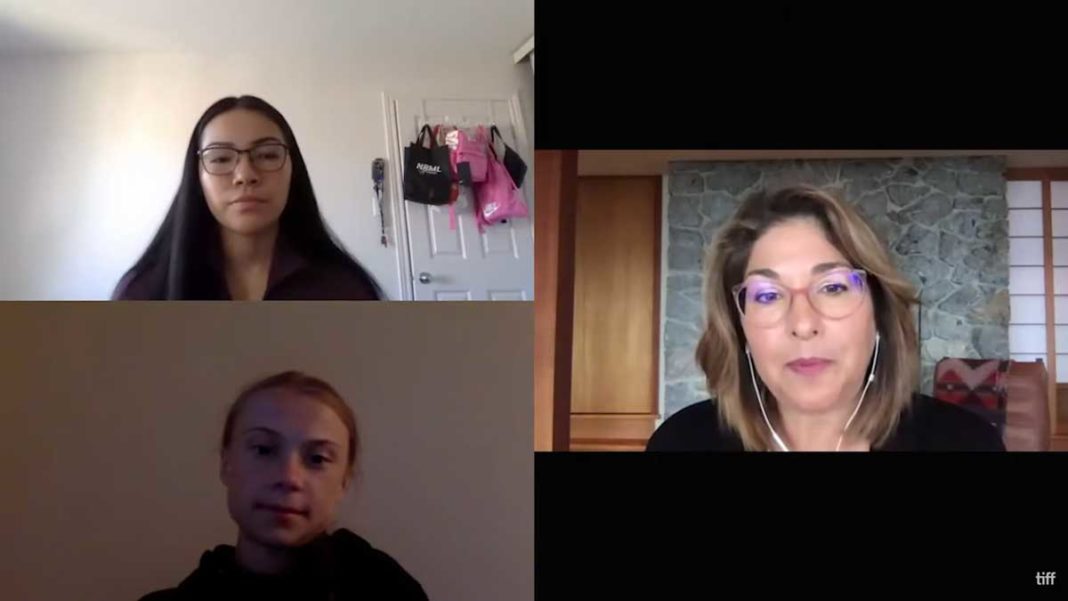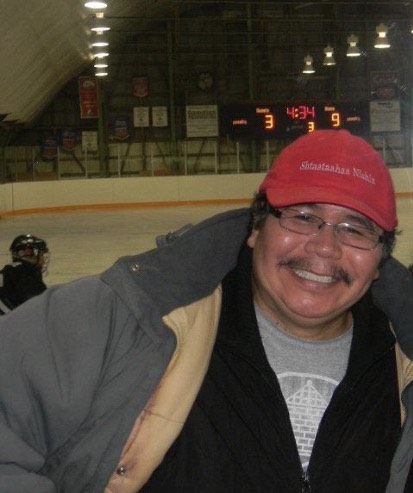TORONTO – The Toronto International Film Festival (TIFF) faced serious challenges this year as it adapted to an online format during the pandemic. Two complementary documentaries about youth activists, Sweden’s Greta Thunberg (Nathan Grossman’s ‘I am Greta’) and Wiikwemkoong’s Autumn Peltier (James Burns’ ‘The Water Walker’), were shown at the festival this year and were followed up with a question and answer panel ‘Youth for Change: A Conversation with Autumn Peltier and Greta Thunberg’ moderated by bestselling author Naomi Klein.
Autumn was described as “a 15-year-old Anishinaabe clean-water activist from Wiikwemkoong Unceded Territory on Manitoulin Island” who has been nominated three times for the International Children’s Peace Prize and continues to fight for Indigenous communities around the world, while Greta was cited as “a 17-year-old climate activist from Stockholm,” who, in 2018, picketed Swedish parliament calling for action on the climate crisis, eventually inspiring student strikes at schools in communities around the world. Greta “addressed the UN Climate Action Summit in 2019 before becoming Time Magazine’s youngest-ever Person of the Year and being named one of Forbes’ 100 Most Powerful Women.”
Interesting to note, Autumn also addressed the UN in New York during the Global Landscapes Forum, a platform on sustainable land use founded by UN Environment and the World Bank dedicated to achieving development and climate goals. She is also the Anishinabek Nation chief water commissioner.
Ms. Klein certainly did not talk down to her two teen panelists, speaking relatively quickly and at times so circuitously in posing her questions to the panelists that even The Expositor was challenged at times to follow the questions through to point. But the two young activists remained undaunted throughout.
With one notable exception that would be familiar to any high school teacher or parent of a teenager, Ms. Klein asked which of the two wanted to go first, a question followed by an almost-uncomfortably long silence. The moderator then decided to put Greta “on the spot.”
The documentary based on Greta focused on media celebrity imposed upon the Swedish climate activist, rather than her message, a situation she clearly does not relish but agreeing with the concept of the absurdity of the burden of focusing on climate change falling on a teenager’s shoulders rather than being taken seriously as a crisis by adults in power.
Autumn also agreed that the burden of protecting the water falling on the shoulders of a teenager falls well into the realm of the absurd.
Early in the panel discussion, Ms. Klein attempted to follow that line with a question to Autumn about the pushback she has been rumoured to have endured from her peers in reaction to Autumn’s notoriety and the media attention she has received in recent years, but Autumn deflected the question to focus instead on her message of the need to protect the water and the important role Indigenous culture plays.
“First Nations people have been noticing drastic changes in the land and the water,” said Autumn. She cited the role her own aunt, water walker the late Josephine Mandamin, played in issuing her call to action and how that had inspired her own work.
“It is a huge honour to be considered,” she said of her role as a prominent water walker herself.
Asked what they hope might come of the documentaries on their work, Autumn said that “everyone needs water and it is a basic human right” and that she hoped that the documentary would help to inspire “us to all come together to protect the land and the water and to become more aware of First Nation issues.”
Greta said she had hopes that the precedent set by the pandemic will help show the way to dealing with the climate crisis, but said she was worried that as the pandemic subsides the clamour of the many charities struggling to bring their issues to the fore will overshadow the crisis that is climate change.
Both young women noted their dismay at being used by politicians as a photo op and the media frenzy that has led to them becoming celebrities and the subject of documentary films.
“Instead of listening to the science, the media is talking about me,” said Greta, emphasizing the “me.” “Politicians waiting for the picture, with me.”
“It is not up to us children,” said Greta about the climate crisis. Foisting the responsibility for dealing with climate change onto youth reflects an absurdity in modern Western culture.
Autumn noted that it is extremely difficult for First Nation communities to gain traction with the government and there is a lack of justice. “There are still hundreds of communities without safe drinking water.”
If there was a divergence in the two young activists’ approaches, it might be in the universality of Greta’s focus—climate change and its impact on the environment, while Autumn’s focus was more upon the need to protect the water and the land from all threats.
Greta noted that, in the end, it all boils down to “sustainability.”
Ms. Klein pointed out that while politicians might be satisfied with a photo op with a youth climate activist instead of concrete action, the two young women have had a major impact on inspiring youth and the attitudes towards climate on up-and-coming youth around the globe.
Greta pointed out that when she began her journey, she thought she was the only one who had concerns about the environment, that her experience of the generation was that they were not concerned and only focused on mundane things in their lives. Her experience has now taught her that there are many youth who have similar concerns and have discovered their voices. “I am not alone,” said Greta. “They just didn’t know how to act.”
Autumn said that she has seen a considerable amount of change amongst Indigenous youth from when she first started. She pointed to the intergenerational trauma that the Anishinaabe people have and continue to endure, their loss of so much since colonization. Losing the ability to engage with the land and the water is simply too much to stand by and endure.
Both young women expressed hope for the future despite the challenges they have seen and met on their individual journeys.





